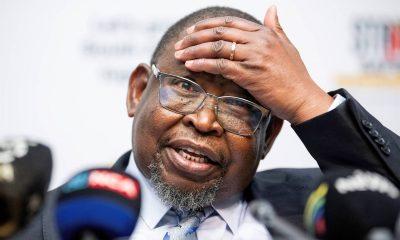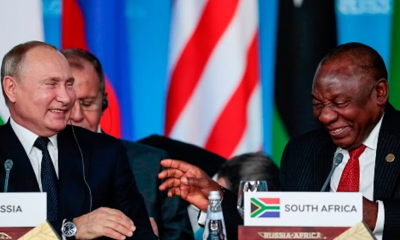Health
Explosive accusations: Gauteng Health bosses accused of rigging tenders for kickbacks scheme!

A former Gauteng Health service provider has recently accused the department’s acting head for the department, Arnold Malotana, along with two other senior officials, of manipulating supply chain processes to rig two tenders in 2016 and 2017. BAS Medxpress, a medical devices company owned by Landus Armstrong, was awarded the tenders in question, allegedly in exchange for kickbacks totalling millions of rands paid to the officials. All parties implicated in the affair have denied wrongdoing, as per News24.
AmaBhungane obtained a copy of the insider’s affidavit, which includes contracts, email communication, invoices, and bank statements as evidence of the corruption allegations. The documents show that Malotana, Motha, and Lecholo took up senior positions in the department when the alleged events happened, giving them access to sensitive information about upcoming contracts and tenders.
The insider alleges that bribes included two tenders. The first was a R31-million contract to deliver plastic containers to the department’s Masakhane Laundry and Cook-Freeze Factory, responsible for producing food for 17 healthcare centres and six hospitals in the province. The second tender went to BAS Med to make up part of a panel of service providers supplying hospitals in Gauteng with orthopaedic equipment and implants for surgery. This tender allegedly resulted in a R3-million kickback payment, of which close to R2-million was transferred from BAS Med’s bank account to two accounts reportedly linked to the officials.
Besides the above payment, there seems to be no money trail between the trio and Armstrong’s BAS Med. The whistleblower claimed that they paid for most of the kickbacks in cash. However, the insider also implicates themselves in the scheme, confessing to being “present on some occasions when cash payments for these government purchase orders were prepared or paid to the officials.”
Also read: Health worker unions expose alarming problems in Gauteng Health Department through protest march
AmaBhungane delivered detailed questions to the officials and Armstrong but only received responses from Armstrong’s lawyers, who denied the allegations but declined to answer any questions due to the ongoing investigation by the Hawks and the SIU. Likewise, Malotana, Motha, and Lecholo declined to respond, citing the ongoing investigation. The Hawks confirmed that investigations are continuing, but no one has received charges.
Masakhane is a Gauteng Health factory that supplies over 115,000 meals monthly to six hospitals and 17 community health centres. In 2016, BAS Med won the three-year tender to manufacture and deliver plastic containers for Masakhane’s frozen food. The tender was awarded based on a scoring system that evaluated technical compliance, price, and BEE-status. BAS Med was the only company to achieve the maximum score of 10 points for BEE, giving it an advantage in the tendering process. However, BAS Med’s submission was not the most affordable option in terms of price, accounting for 90% of the points in the second evaluation stage.
The insider reported that before Malotana and others awarded the tender, multiple meetings took place between Armstrong, Malotana, Motha, and Lecholo, in which they agreed that Gauteng Department of Health officials would receive a cash payment amounting to R6 million upon signature of the contract. The contract’s value was approximately R31 million, close to 20% of the total value of the tender. BAS Med’s advantage was allegedly due to the company’s “contacts” that would “assist with the approval” of its application rather than technical expertise.
The whistleblower provided the Hawks with a thread of emails that showed BAS Med had a two-week head start to prepare its submission. Motha sent the tender specifications to Armstrong using his Gauteng Health email address, with the official merely telling Armstrong to “note” the attachment of the specifications concealed under a liquor store’s flyer cover page. Lecholo, the assistant director in the contract management unit in the supply chain, was part of the tender process. The insider claimed that Lecholo provided BAS Med with samples of the plastic containers, which they then submitted for the bid. Lecholo also faces accusations of allowing BAS Med to amend its submissions, including pricing, after the company delivered its tender on 30 April 2015, the closing date for all offers.
The insider alleged that the advantage that BAS Med had was not due to its technical expertise but rather because the company has “contact[s]” that would “assist with the approval” of its application. In contrast, BAS Med, a medical devices company, had no experience in food packaging manufacturing. The insider estimated that Masakhane would require at least 200,000 lids, 1.5 million three-divisional trays, and 150,000 small desert tubs annually for the next three years.
The company expressed dissatisfaction with its service almost immediately after Masakhane signed its contract with BAS Med. Internal emails show that BAS Med struggled to deliver the required containers for preparing food for patients. BAS Med reportedly attempted to buy these containers from Plastform, a company that lost the tender. An email sent by David Van Zyl from Masakhane to BAS Med and other departmental officials complained about BAS Med’s broken promises. It claimed another company informed them that the containers were bought from them, proving that BAS Med had lied to them from the start. Van Zyl reported that on 26 April, after four weeks, BAS Med had only managed to deliver 5 000 containers, which caused Masakhane, producing 5 500 meals on average daily, to “come to a standstill.” BAS Med eventually had to buy 50 000 units from Plastform, as it was the only way to meet the orders. A BAS Med bank statement showed Plastform’s parent company received a payment of over R231 000 on 29 April. It was unclear why BAS Med could not procure the containers from the supplier named as a subcontractor in their bid application documents. Rose Phashe, Gauteng Health’s supply chain director for contract management, and her assistant Lecholo received information about the challenges and were seemingly unfazed. There were no consequences from the department, even though the company had been unable to meet its contractual obligations.
Also read: Gauteng’s Emergency Response gets a major boost with 200+ new vehicles!
BAS Med signed a service-level agreement with the department on 17 May, despite failing to meet its contractual obligations. Armstrong visited Phashe’s office, where he apologised for BAS Med’s stock crisis. Armstrong was allegedly “met by Edgar Motha to deliver R100 000 in cash as a token of gratitude for assistance in resolving the complaints from Masakhane.” Phashe retired from the department in 2021 and denied any accusations of receiving money from BAS Med or giving the company special treatment.
BAS Med delivered a bid for another tender at Gauteng Health to be included in a panel of service providers supplying orthopaedic implants for shoulder and spine surgeries at public hospitals in Gauteng. The company delivered its bid in February 2016 and received the tender in April 2017. The whistleblower alleged that the officials asked for “R3-million in cash in advance and then a percentage of the invoice value of each surgical procedure we completed during the tender period.” Although it is unclear what the officials would receive payments for this time, BAS Med did not lean on the trio for assistance, according to the insider. The insider wrote in his affidavit that Armstrong had advised him not to attempt to be awarded the tender since “there was no ‘contact’ at the Department of Health to assist with the approval.” The insider applied for the tender because they had been servicing hospitals with their spine implants and instruments. They introduced their products to the heads of orthopaedic departments at Chris Hani Baragwanath Academic Hospital, Charlotte Maxeke Johannesburg Academic Hospital, and George Mukhari Academic Hospital. The insider claims that three weeks before the recipient received the tender, Armstrong informed him that Gauteng Health officials wanted to meet to discuss the orthopaedics tender.
In 2022, criminals hijacked the white Mercedes Benz belonging to Motha. Ndlovu asked his Facebook followers for help locating the car and later thanked them when police found it. Ndlovu confirmed to amaBhungane that the Hawks questioned him in early 2022. Ndlovu stated that he was scared and did not know where the investigation would lead. He claimed that he knew Armstrong because Armstrong had bought equipment related to security from him but denied that he facilitated any payments or bribes to Gauteng Health officials. He also denied knowing anything about the officials whose photographs included him on his Facebook page.
Also read: Gauteng Health infrastructure in jeopardy as MEC slashes R300M budget – what happens next?
Gauteng Health and its facilities have experienced numerous corruption scandals in the past few years, including the murder of Babita Deokaran, a whistleblower who requested a forensic investigation into procurement at Tembisa Hospital. Deokaran was the provincial department’s chief director of financial accounting and discovered R850 million worth of questionable payments just before her death. In addition, senior officials, including former Gauteng Health MEC Bandile Masuku, chief finance officer Kabelo Lehloenya, and head of the department Professor Mkhululi Lukhele, received suspensions or dismissals after being implicated in a corruption scandal involving personal protective equipment tenders. The whistleblower’s allegations against Malotana, Motha, Lecholo, and Armstrong are unrelated to the Tembisa or PPE scandals. Still, they may provide information about high-level interests that have made corruption and the maladministration of public healthcare funds routine at Gauteng Health.
The whistleblower claimed that the alleged kickback arrangement between Armstrong and the trio was not limited to tenders but included more minor contracts valued at under R500,000, secured through requests for quotations (RFQ). However, only purchases above R500,000 require an open tender process that is more competitive, transparent, and rigorous than RFQs. In addition, the insider claimed that payments made to government officials of either 10% of the invoice value or that the inflated prices of goods or services supplied were to accommodate their portion of the payout.
A letter shows that some BAS Group companies and specific contracts at Gauteng Health are part of a possible probe by the Special Investigations Unit (SIU), separate from the Hawks investigation. The SIU’s investigation focuses explicitly on alleged procurement inconsistencies concerning contracts awarded by the Special Projects Directorate at Masakhane. On 23 February 2023, the SIU wrote to the former head of the department Dr Nomonde Nolutshungu requesting information about all the maintenance projects and companies awarded infrastructure at Masakhane between 2017 and 2022. Ndlovu’s Mamotlaletsi and another company, Mellisto Trading, are among the companies mentioned in the letter, with allegations that they charged exorbitant prices and benefited from irregular evaluations.
Ndlovu stated that his and his son’s companies were independent and did not comment on their work at Masakhane. The SIU noted in its letter that Masakhane’s officials allegedly reported these inconsistencies to the relevant senior officials, who did not address the matters and protect implicated officials. Those who reported the issues were said to have been victimised or subjected to an occupational detriment. The SIU said it had received the documents from the department and is still assessing them.
Also read:
Picture: Twitter / City_Press






















